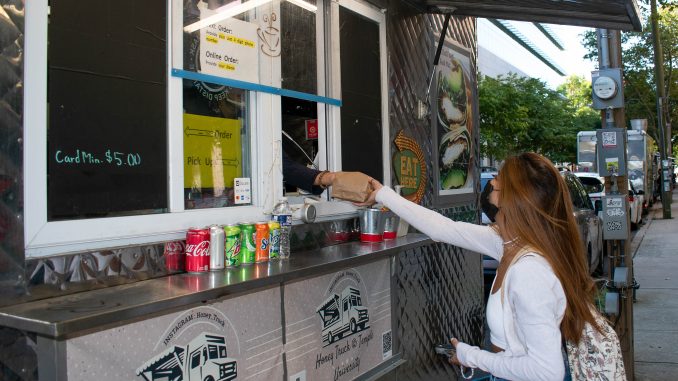
Since transferring to Temple University this fall, Seth Gorrell visits his favorite food truck, Ebi’s Halal Lunch Cart, as often as he can afford.
While Gorrell loves Ebi’s lamb gyro, he mainly returns each week to see Ali Belkacem, owner of Ebi’s on 13th Street and Montgomery Avenue since 2019.
“Just the general service as a whole is very encouraging,” Gorrell said. “He is a very good guy.”
Since the 1960s, Temple’s thriving food scene has not only provided convenient dining options for students, but the chance to form relationships with vendors whose restaurants they visit. Student regulars appreciate the sense of dependable connection that buying from local businesses affords them.
Belkacem appreciates regulars, like Gorrell, and strives to connect with his customers by asking them about their day to give a more personable and friendly experience while they order food, he said.
Regulars are the driving force that inspires Belkacem to keep returning to work each week, he said.
“The relationship between me and customers is the most important for me,” Belkacem said. “The career point for me is to make my customers satisfied, getting food here and the feedback of my customers is really important. That’s what is encouraging me to do more and more.”
Just as Gorrell quickly found his go-to spot on campus after transferring, Victoria Hyland, a senior actuarial science major, has frequented her favorite spot, Fame’s Famous Pizza, since she first arrived at Temple in 2018.
“I started going [to Fame’s] freshman year with a friend who recommended it, and ever since then, I’ve been hooked,” Hyland said. “Pizza is my favorite food, so I had to try all of the places on campus and nowhere compares.”
Hyland visits Fame’s every two weeks, enjoying a slice of buffalo chicken pizza, the occasional chicken caesar wrap and her camaraderie with Fame’s workers, she said.
The positive, welcoming atmosphere has made Hyland a consistent returning customer, she said. She feels that the people at Fame’s treat everyone like family.
Feim Amzovski, who has been an owner of Fame’s Famous Pizza at The Wall on 12th Street between Polett Walk and Montgomery Avenue since 1985, aims to treat every customer like family, he said.
“I have a lot of steady customers,” Amzovski said. “I get freshmen every year, and I definitely get a lot of alumni when they’re in the area, they come back. And, in fact, yesterday a student that was here in 2001 and she got a job at a Temple, she was shocked to even see me.”
Caitlyn Changco enjoys the personal connection she has to food vendors, like Jennifer Paek, owner of the Honey Truck, located at Norris and 12th streets.
“I grew up in a restaurant,” said Changco, a sophomore undeclared major. “My family’s owned a restaurant for, like, 40 years now, so I always think I am actually more inclined to feel a relationship with whoever is working such a business. Especially if It’s like an Asian woman—it’s more of my inclination to feel generosity towards the owner.”
Changco visits the Honey Truck once a week, often going with friends and ordering the Chicken Avocado Wrap, because it is her comfort food, she said.
Changco appreciates the friendly and welcoming atmosphere posed by the owners and location, she said.
The COVID-19 pandemic has made staffing food trucks more difficult, but regulars like Changco have made up for these difficulties, Paek said.
“Because of the pandemic, it’s hard to find employees for all the restaurants,” Paek said. “Some of the food trucks are not open yet because there’s no employees, so having a regular, good relationship with customers and having a lot of regular customers helps us stay open.”
Gorrell has gone out of his way to support his favorite business because he recognizes how difficult it was to stay afloat during the past year and a half, especially with virtual classes preventing students from buying food on campus.
“It’s a miracle to kind of make it out of the pandemic as a small business and then even to just be able to keep doing what you’re doing,” Gorrell said. “I think it’s very encouraging for somebody that isn’t in this small business to be able to help them and to be able to support as much as they can.”
This support also contributes to the diversity of cultures on campus by maintaining the variety of food options from different backgrounds, Changco said.
“You need more of a diversity and a blend of businesses and their products that they sell, and what they have to offer, rather than just always supporting a corporation,” Changco said. “It’s always more fun when you’re going to a new place and their local businesses showcase the culture of the community you’re currently in.”



Be the first to comment